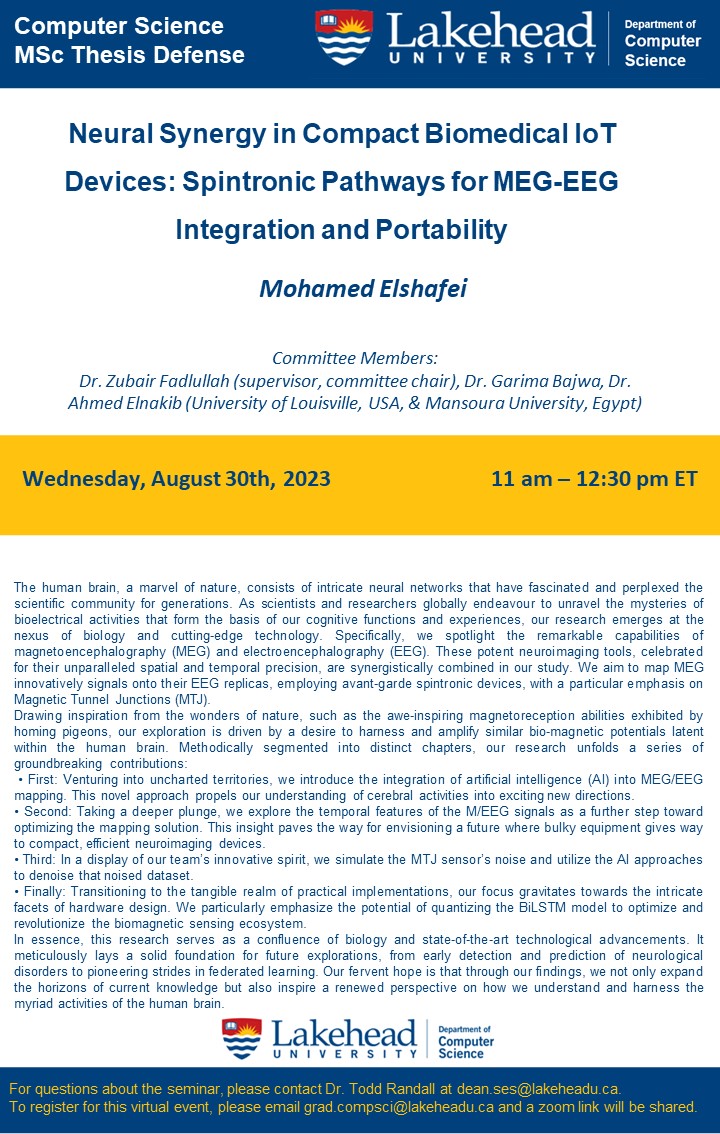Computer Science Department Thesis Defense - Mohamed Elshafei

Please join the Computer Science Department for the upcoming thesis defense:
Presenter: Mohamed Elshafei
Thesis title: Neural Synergy in Compact Biomedical IoT Devices: Spintronic Pathways for MEG-EEG Integration and Portability
Abstract: The human brain, a marvel of nature, consists of intricate neural networks that have fascinated and perplexed the scientific community for generations. As scientists and researchers globally endeavour to unravel the mysteries of bioelectrical activities that form the basis of our cognitive functions and experiences, our research emerges at the nexus of biology and cutting-edge technology. Specifically, we spotlight the remarkable capabilities of magnetoencephalography (MEG) and electroencephalography (EEG). These potent neuroimaging tools, celebrated for their unparalleled spatial and temporal precision, are synergistically combined in our study. We aim to map MEG innovatively signals onto their EEG replicas, employing avant-garde spintronic devices, with a particular emphasis on Magnetic Tunnel Junctions (MTJ).
Drawing inspiration from the wonders of nature, such as the awe-inspiring magnetoreception abilities exhibited by homing pigeons, our exploration is driven by a desire to harness and amplify similar bio-magnetic potentials latent within the human brain. Methodically segmented into distinct chapters, our research unfolds a series of groundbreaking contributions:
• First: Venturing into uncharted territories, we introduce the integration of artificial intelligence (AI) into MEG/EEG mapping. This novel approach propels our understanding of cerebral activities into exciting new directions.
• Second: Taking a deeper plunge, we explore the temporal features of the M/EEG signals as a further step toward optimizing the mapping solution. This insight paves the way for envisioning a future where bulky equipment gives way to compact, efficient neuroimaging devices.
• Third: In a display of our team’s innovative spirit, we simulate the MTJ sensor’s noise and utilize the AI approaches to denoise that noised dataset.
• Finally: Transitioning to the tangible realm of practical implementations, our focus gravitates towards the intricate facets of hardware design. We particularly emphasize the potential of quantizing the BiLSTM model to optimize and revolutionize the biomagnetic sensing ecosystem.
In essence, this research serves as a confluence of biology and state-of-the-art technological advancements. It meticulously lays a solid foundation for future explorations, from early detection and prediction of neurological disorders to pioneering strides in federated learning. Our fervent hope is that through our findings, we not only expand the horizons of current knowledge but also inspire a renewed perspective on how we understand and harness the myriad activities of the human brain.
Committee Members:
Dr. Zubair Fadlullah (supervisor, committee chair), Dr. Garima Bajwa, Dr. Ahmed Elnakib (University of Louisville, USA, & Mansoura University, Egypt)
Please contact grad.compsci@lakeheadu.ca for the Zoom link. Everyone is welcome.

